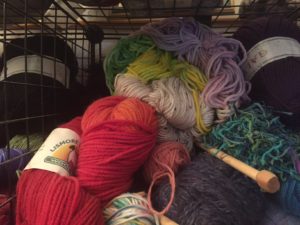ALTERNATIVE FACTS
This is not, I promise you, a post about politics. No, what I want to talk about today is the delicate art of entwining truth and lies. Still not politics! I’m talking about writing fiction.
Now, some stories are explicitly based on lies: werewolves and vampires roam our streets. Humans have colonized other planets (and perhaps made the acquaintance of sexy aliens). Medieval northern Europe was populated by fairies, elves, wizards, and dragons. During the Victorian era, people explored lost continents in steam-powered submarines. This is the world of speculative fiction, and by definition, these stories include elements that do not exist. They contain lies.
Other stories, of course, have their basis more firmly in truth. Contemporary romances fall into this category, as do many historicals. Mysteries and suspense stories, erotica, Westerns… these all operate on the premise that they are depicting the world as it actually exists (or as it actually used to be).
But fiction’s a lot more complicated than that. Even the most imaginative speculative fiction contains truths. For example, those stories often reflect accuracies about aspects of human nature, such as love, ambition, jealousy, and anger. If they didn’t—if the people in the stories thought and acted nothing like real people—we wouldn’t be interested in reading about them.
In fact, some of the strongest, most persuasive, most subversive arguments about our reality have been made via speculative fiction. Consider The Handmaid’s Tale, which makes more powerful points about theocracies, misogyny, racism, and classism than an essay ever could. Bladerunner (and the novel it was based on, Do Androids Dream of Electric Sheep?) explores what it means to be human. Even The Wizard of Oz has something to tell us about brains, courage, and love, as well as the meaning of home.
And while truths are woven throughout spec fic, lies are prominent in other forms of fiction. After all, the word fiction itself derives from the Latin for “contrived.” Our characters are not real, even if based on real people. The conversations and events never really happened, at least in their entirety. Even the places may be invented. One of my contemporary books takes place in the town of Rattlesnake, a location so real in my head that I once forgot that I can’t really have breakfast at Mae’s Café. But Rattlesnake (and sadly, Mae’s) exist only in our imaginations. They are lies.
So all of our stories, regardless of genre, are tapestries of truths and lies. And here’s one of the keys to good stories: both the truths and the lies need to feel real to readers. On the truth side, we authors need to do our research and do it well, even if the issue is a minor one. If we mess that stuff up, somebody somewhere is going to notice, and that small inaccuracy will make that person lose trust in the story as a whole. On the other side, our lies have to feel real too. This means we have to flesh them out, make them consistent, make them logical in whatever context we’ve put them.
 I wrote a book in which an average guy from modern-day California gets zapped by a goddess to an alternate universe. When he gets there, he has to engage in a pilgrimage in order to appease a different god for acts committed by the Californian’s AU doppleganger. He’s guided along the way by a hunky ex-soldier with a tragic past and a drinking problem. Yeah, that’s a whole lot of lies right there. I remember, though, what one reviewer said. The AU, the gods and magic, the hunky guy? All good. The part that bugged her was that when my Californian returned home and told his family about his adventures, the family accepted his tale pretty easily. In other words, in this reviewer’s eyes, I did a convincing enough job with the outright falsehoods. But the parts anchored in reality—a guy telling his mom and sister about what had just happened to him—those parts didn’t work. For this reviewer, it was the truthier bits of the story that she couldn’t buy.
I wrote a book in which an average guy from modern-day California gets zapped by a goddess to an alternate universe. When he gets there, he has to engage in a pilgrimage in order to appease a different god for acts committed by the Californian’s AU doppleganger. He’s guided along the way by a hunky ex-soldier with a tragic past and a drinking problem. Yeah, that’s a whole lot of lies right there. I remember, though, what one reviewer said. The AU, the gods and magic, the hunky guy? All good. The part that bugged her was that when my Californian returned home and told his family about his adventures, the family accepted his tale pretty easily. In other words, in this reviewer’s eyes, I did a convincing enough job with the outright falsehoods. But the parts anchored in reality—a guy telling his mom and sister about what had just happened to him—those parts didn’t work. For this reviewer, it was the truthier bits of the story that she couldn’t buy.
The moral of all of this? In fiction, truth and lies are inescapably entangled, and a skilled writer must do a good job of knitting them together. To push the analogy probably farther than it wants to go, we want a comfy cardigan, not a hopeless knot or something that falls apart as soon as we pick it up. And let’s hope we can keep our alternative facts out of politics and in fiction, where they belong.
 Kim Fielding is the bestselling author of numerous m/m romance novels, novellas, and short stories. Like Kim herself, her work is eclectic, spanning genres such as contemporary, fantasy, paranormal, and historical. Her stories are set in alternate worlds, in 15th century Bosnia, in modern-day Oregon. Her heroes are hipster architect werewolves, housekeepers, maimed giants, and conflicted graduate students. They’re usually flawed, they often encounter terrible obstacles, but they always find love.
Kim Fielding is the bestselling author of numerous m/m romance novels, novellas, and short stories. Like Kim herself, her work is eclectic, spanning genres such as contemporary, fantasy, paranormal, and historical. Her stories are set in alternate worlds, in 15th century Bosnia, in modern-day Oregon. Her heroes are hipster architect werewolves, housekeepers, maimed giants, and conflicted graduate students. They’re usually flawed, they often encounter terrible obstacles, but they always find love.
After having migrated back and forth across the western two-thirds of the United States, Kim calls the boring part of California home. She lives there with her husband, her two daughters, and her day job as a university professor, but escapes as often as possible via car, train, plane, or boat. This may explain why her characters often seem to be in transit as well. She dreams of traveling and writing full-time.
Follow Kim:
Website: http://www.kfieldingwrites.com/
Facebook: http://facebook.com/KFieldingWrites
Twitter: @KFieldingWrites
Email: Kim@KFieldingWrites.com
Newsletter: http://eepurl.com/bau3S9
A complete list of Kim’s books: http://www.kfieldingwrites.com/kim-fieldings-books/


Wait… hot werewolves are lies ?! You just break my heart :’-(
That’s interesting, I’ve never thought of fictions as lies, but I see your point. Intertwining truth and lies is not an easy job. The first example coming in my mind is Dan Brown’s Da Vinci Code. When reading this book, I was sometimes wondering “is it fictional, conjecture or an actual fact ?” I think that it was what I liked the most and frustrated me at the same time ^^
But improbable situations are not necessarily bad. Pilgrimage ending is really fresh in my head (and now I’m wondering if “fresh” can be used in this context in English, sorry for my likely errors) as I re-read it a couple of weeks ago. Yes, I had the very same thought about the family’s reaction : “well, this is so unreal”… But I love it, I find their reaction so heartwarming and I wouldn’t want another reaction from them. I don’t care if there’s a tear in the writer’s knitting as long as it gives me good feelings
I’m sorry to break the news about hot werewolves. It makes me sad too.
(Your English is beautiful, and yes, fresh is perfect in this context.) And that’s a great point about being tolerant of tears in the knitting!
If fiction is more complicated than fact we are in a world of hurt. I’m not sure how much more complicated our world can become…
I know what you mean. If someone wrote a novel depicting, for instance, the current political situation in the USA, everyone would complain it wasn’t believable.